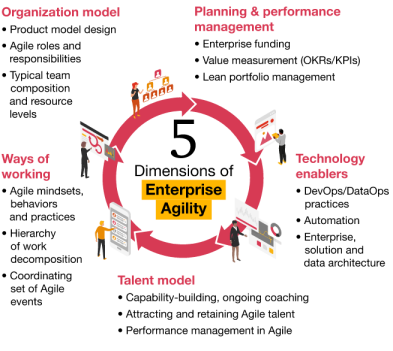Articles

Corporate culture makes employees happier (statistics)
Corporate culture plays a vital role in shaping the employee experience and overall satisfaction within an organization. In the case of Georgia its unique characteristics and values have been proven to contribute to happier employees. In this article, we will introduce the survey about employee’s job satisfaction in Georgia.
Research description:
In 2023, a group of researchers from the Faculty of Economics and Business of Ivane Javakhishvili Tbilisi State University conducted a survey to find out the job satisfaction of employees in Georgian companies. 1569 employees, among them 868 - from the private sector and 701 - from the public sector
The research authors carried out in Georgian companies. 1509 employees from both private and public sector businesses were interviewed. The employees were given 54 questions, of which 12 questions were related to job satisfaction. Whole article is vailablehere.
Job satisfaction is related to the employee's attitude towards his work. Types of work-related attitudes are job satisfaction, work involvement, and commitment to the organization (Moy, Gilson, & Harter, 2004). Attitude expresses a person's feelings towards some event, in this case towards work. A person whose degree of job satisfaction is high has a positive attitude towards this work and therefore performs it with great pleasure and high quality. (Narmania et al., 2023)
The research had shown that overall, 92,6% of Georgians are satisfied or partially satisfied with their work (in the context it means the work which they do, activities and such). The answers about the salary: 21,7% is satisfied, 44,7 partially satisfied and 33,6 unsatisfied with the salary.
What is important for this article are findings about specific Georgian internal personal motivators which influence satisfaction in work
Interesting is the figure about the frequency by which are professional events to educate employees usually hold:
The authors however are very concerned about the trustiness of the answers. We highly recommend reading the article in whole. And one mention to think about: authors used the scale 1-3 satisfied, partly and not. We would rather recommend to you the scale 1-5, satisfied, rather satisfied, no opinion, rather unsatisfied and unsatisfied. Biffer range of answers give to the participant the option to move on the scale.
But what are the scientist doing the research quite sure is that bigger priority in the satisfaction have internal factors more than external. Internal factors are like doing a pleasant job, the possibility of to be accepted, the prospect of career advancement, or sense of the work they are doing. External are wage or bonuses.
So, what to do?
Employee Engagement and Satisfaction:
Corporate culture places a strong emphasis on building close-knit work communities where employees feel a sense of belonging and camaraderie. Employees who feel connected to their work community and share a common set of values experience greater job satisfaction, leading to higher productivity and commitment to the organization.
Sense of Purpose and Meaningful Work:
Corporate culture values the concept of purposeful work, where employees find meaning and fulfilment in their professional endeavours. Organizations that prioritize aligning employee goals with the company's mission and values experience higher levels of job satisfaction. When employees understand how their contributions positively impact the organization and society, they feel a deeper sense of purpose and fulfilment in their work.
Work-Life Balance and Well-being:
Built corporate culturewhich recognizes the importance of maintaining a healthy work-life balance and prioritizing employee well-being. Employees who have a healthy work-life balance and access to well-being initiatives report higher levels of happiness and job satisfaction, leading to increased productivity and reduced stress levels.
Recognition and Appreciation:
Built corporate culture that places great value on recognizing and appreciating employee contributions. Employees who receive regular acknowledgement and appreciation for their efforts are more likely to feel valued, motivated, and happier in their roles. This positive reinforcement fosters a supportive work environment that encourages growth, engagement, and loyalty.
Employee Retention and Talent Attraction:
The positive impact of corporate culture on employee happiness extends beyond the current workforce. Companies that prioritize theunique cultural values tend to attract top talent and experience higher employee retention rates. Employees are more likely to stay with organizations that align with their values and provide a supportive and positive work culture.
Corporate culture has a significant influence on employee happiness, as supported by various researchers around the globe. The emphasis on community, purposeful work, work-life balance, recognition, and appreciation creates an environment where employees feel valued, engaged, and motivated. By fostering a strong corporate culture, organizations can cultivate happier employees who contribute to increased productivity, improved retention rates, and enhanced overall success.
(Created by GPT 4.0)
Source:
Narmania, D., Vardiashvili, N., & Makasarashvili, M. (2023). The Survey of Employers’ Job Satisfaction in Georgian Companies. JOURNAL OF ECONOMICS, FINANCE AND MANAGEMENT STUDIES, 06(10). https://doi.org/10.47191/jefms/v6-i10-58
Other Article

Corporate culture in context of strategy and leading the company
Strategy and culture are key tools for leaders to keep their organizations effective and viable. By: Martina Švecová

List of the articles sorted by issues
Corporate culture in context of strategy and leading the company By: Martina Švecová Eight distinct cultural styles By: Martina Švecová

Agile as a way of thinking and part of corporate culture
One of the core principles of the Agile way of thinking is adaptability. By: John Melek and Sama Khafaga

 Add Statement
Add Statement
 Authorization
Authorization
